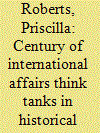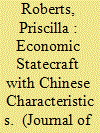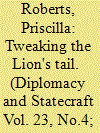|
|
|
Sort Order |
|
|
|
Items / Page
|
|
|
|
|
|
|
| Srl | Item |
| 1 |
ID:
142219


|
|
|
|
|
| Summary/Abstract |
This essay surveys the operations of foreign policy think tanks, and how they have functioned to create transnational knowledge networks, since their emergence in the early twentieth century, around the First World War. It discusses how patterns of linkages among foreign policy think tanks changed and evolved over time, and were linked to broader Anglo-American, imperial, and internationalist networks and relationships, and to the changing international political climate and configuration. It suggests some ways in which think tanks contributed to Cold War interchanges between different states, especially to Soviet bloc–Western relations and Asian–Western relations. It concludes by discussing the recent proliferation and frequent globalization of foreign policy think tanks, and suggests how such trends may develop in future.
|
|
|
|
|
|
|
|
|
|
|
|
|
|
|
|
| 2 |
ID:
184219


|
|
|
|
|
| Summary/Abstract |
The term “economic statecraft” is increasingly employed to describe China's use of economic resources to pursue objectives spanning the political, economic, and strategic spheres. One recent study suggests that “China's sophisticated use of economics in its foreign policy is still a fairly recent phenomenon.” Yet close scrutiny of how since at least the early 1900s Chinese leaders sought to use economic leverage as a foreign policy instrument suggests that the antecedents of contemporary Chinese economic statecraft date back to the founding of the People's Republic of China and even before. This special issue represents an effort to explore in some depth in what ways post-Cold War Chinese economic statecraft does indeed represent a novel phenomenon, as opposed to the simple continuation of earlier trends; to identify its most important features and follow its evolution over time; and to investigate in detail several specific recent case studies.
|
|
|
|
|
|
|
|
|
|
|
|
|
|
|
|
| 3 |
ID:
116360


|
|
|
|
|
| Publication |
2012.
|
| Summary/Abstract |
In its first 2 decades the Canadian Institute of International Affairs (CIIA), Canada's premier foreign policy think tank, never functioned merely as a neutral and apolitical research organization. Under the leadership of Edgar Tarr, president of the Monarch Life Assurance Company, and in its capacity as the Canadian Council of the transnational Institute of Pacific Relations (IPR), in the 1930s and 1940s the CIIA became an instrument that championed Canadian national autonomy and sought to expand Canada's international role, while challenging British imperialism, racism, and Anglo-Saxon dominance. Prominent Canadian diplomats and other officials were complicit in this enterprise, which reached its apogee at the IPR conference held at Mont Tremblant, Quebec, in December 1942. The CIIA's activities during this period revealed the porosity and imprecision of the boundaries in Canada between the state and non-state realms. Throughout World War II, DEA and other Canadian government representatives attended CIIA and IPR conferences as "official non-officials," effectively cooperating with private individuals in a network of purportedly non-governmental organizations that enabled Canada to exert leverage on the British government, reject British leadership, align itself with the United States, and secure a greater world role. CIIA leaders and Canadian officials also consciously encouraged nationalist forces in India, China, and Southeast Asia that sought to reject colonial rule and Western dominance. CIIA activities thus became part of a web of diplomatic interactions across a transnational network of think tanks within and outside the British Empire that had their own impact upon international affairs.
|
|
|
|
|
|
|
|
|
|
|
|
|
|
|
|
|
|
|
|
|